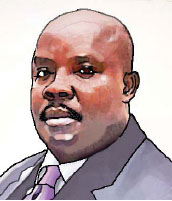By Emeka Alex Duru
German dictator, Adolf Hitler, spoke derogatorily of herd-instinct in his book, Mein Kampf. In it, he wrote on how a people, driven by the mood of the moment, could embark on an action, without thinking through it. His analogy was that of a herd of cattle headed towards a certain direction without a purpose. Hitler was a sadist and not a model in human resource management and international relations. But we must distinguish Hitler the messenger from the message, itself. It is by doing so that we can appreciate the herd-mentality by the Nigerian government in its handling of the Coronavirus, otherwise called the COVID-19 that is currently ravaging the World.
As in other instances, we have been jolted from our lethargy and like someone dazed in a boxing bout, we have been scrambling and rambling, not really knowing what to cling on and where to focus our attention. All the while, the writing had been bold and clear on the wall. Sufficient alerts had been raised. But in the typical Pentecostal, ‘it is not my portion’ style, the government had failed to take the necessary precautions. Now, caught in the web of the uncertainties of the pandemic and its ferocious spread, the authorities have staggered into action, lacking the compass in a way, scholars in strategy would refer to, as going into war without plan. This is the easiest way to understand the current frenzy by the states and federal government in rolling out measures at containing the spread of the disease.
In the last couple of days, states and the government at the centre have laid out guidelines on halting further spread of the virus. Among these are closure of schools from primary to tertiary levels, restriction on public gatherings, emphasizing on public hygiene, recommendations on social distancing and others. Short of closing the markets, prescriptions have also been made on limiting the level of contacts in the event of buying and sellig being inevitable. Perhaps, the most pronounced measure was in closing the nation’s airspace to incoming and outgoing flights. And as Information Minister, Lai Mohammed would say, government is considering tougher measures ahead, if the need arises.
These are in line with what other countries are doing to keep their people safe. The challenge however, is how prepared we are to go the whole hog in containing the spread of the virus. Put in other words, how ready are we to combat the spread of the disease? Aside the precautionary measures, what are the strategies on ground in confronting the disease? Besides the near or complete lockdown, what is the next step?
The government does not seem to have any answer to these questions. Since 2019 when the news of the pandemic broke in Wahun Province, China, it was apparent that the Nigeria was not prepared to confront or contain it. At all levels of governance, scant attention was given to the disease. While the executive arm treated it as a non-issue, the legislature trivialized it. In the process, the calls from concerned quarters to shut the airspace, were treated with disregard. High state officials and other privileged citizens rather carried on, moving in and out of the country, living in delusion that they would not be affected by the disease. Now, as some would say, the chickens have come home to roost. Everybody is endangered. Contrary to the thinking in high places, evidences have shown that it is not a disease restricted to the poor. We are consequently in a heat of sort. But how long will the panicky measures go?
Elsewhere, where the systems are planned and government exists for the people, the lockdown and other emergency measures are working and can be enforced. They have welfare schemes and other safety nets. This is not the case here. We are in a different world altogether. In Nigeria, more than 80 percent of the citizens are governments unto themselves, in a way. They fend for themselves, they are responsible for their power supply, security, transportation, health needs and other social services. They only feel the impact of government in being compelled to pay taxes or other levies. Meeting these obligations and in fact, remaining alive, requires going out every day. For them, therefore, keeping to the prescriptions of the government on social distancing and near lockdown, may sound nice but fending for their families and falling into the risk of possible contracting the disease, is also a major challenge.
In the best of environments, this is the time for government to activate its electoral promises to the people, if for any other thing, offer them sense of hope. In 2014, the All Progressives Congress (APC) presented Nigerians with a 10-point agenda it would focus on to make life meaningful if elected in 2015. Highlights of the presentation included job creation; anti-corruption fight; free; relevant quality education; agriculture; housing plan; and healthcare plan for children and adults. The party also listed social welfare scheme for the less advantaged, among other schemes. But like the Peoples Democratic Party (PDP) that was in power earlier, APC has turned out a huge fraud. All the social benefits it promised the people have rather been kept in breach. In place of hope, it has given the people cause to worry.
In such situation, the lockdown and other measures being rolled out by the government may not be fully attained. There is, on one hand, the desire to adhere to the pronouncements by the government and prevent the spread of the disease. There is also the danger of families losing loved ones to hunger and other needs in not venturing out in their daily routines. It is really a tough choice, however it is seen. The people must go out to fend for themselves and their families. The situation therefore goes beyond the likes of the Information Minister prancing about, threatening or scaring Nigerians with tougher measures ahead in containing the COVID-19 pandemic. The times are already hard and tough. It has actually not been a smooth sail for Nigerians under the Muhammadu Buhari administration, even in the best of its times. Nothing and perhaps, no situation could be tougher in the days ahead. That is the truth!













